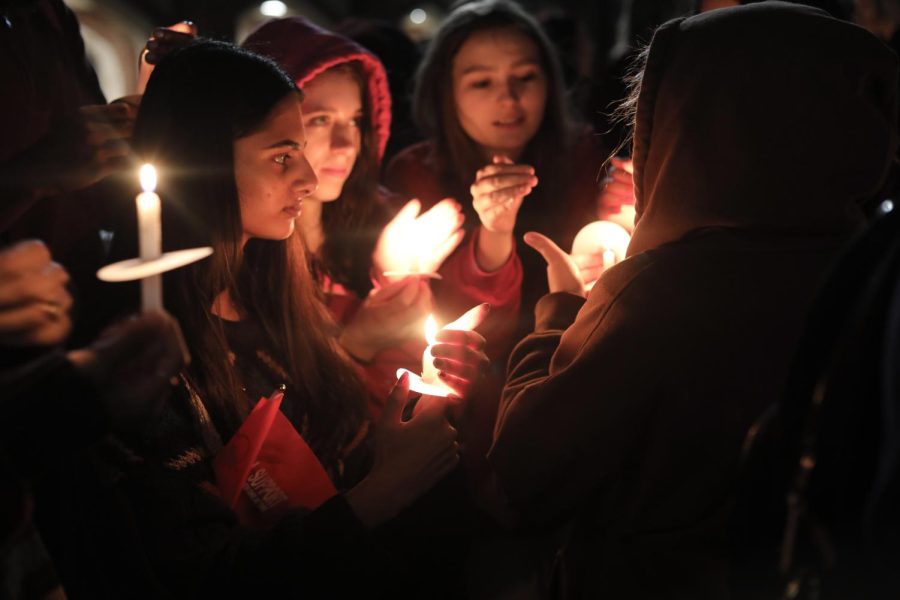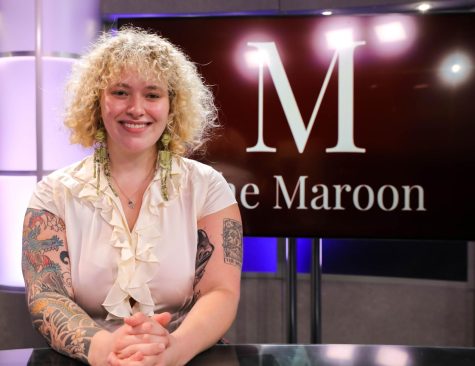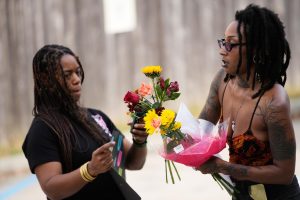Students shine light on sexual violence during Take Back the Night
Students gather in the Loyola Horseshoe parking lot to honor survivors of sexual assault at the Take Back the Night event on Oct. 18. This event is the oldest worldwide organization against sexual assault.
October 20, 2022
Under a pink sky, Melanie Crockett told dozens gathered outside of Loyola’s red brick about years of childhood sex abuse that followed her into her 20s. Though Crockett, a member of the sexual assault prevention and health education department at Xavier University, stayed silent about her experience for most of her life, she said she recently decided to speak out. She hopes to inspire others to do the same.
“College students can become victims at any given moment and need to be made aware that it is okay to speak up about it and against it,” Crockett said.
Crockett’s words echoed Oct. 18 at the city’s annual Take Back the Night event hosted by Loyola’s Women’s Resource Center. After speakers discussed instances of global sexual violence, attendees lit candles together as a community to stand as “light in the darkness” of sexual violence,” Crockett said.
They then marched through campus to Tulane University, where individual survivors there shared their stories and reminded those who were still struggling in the dark that they are not alone, and never at fault.
“Telling someone saved my life,” Crockett said in her speech. “Speaking out started my healing process … and while I can’t say healing has been easy, it has been helpful.”
Crockett added that she is now making it her mission to remove the “the guilt, the blame, the shame, and the fear” that she and so many other victims of sexual and domestic violence have endured.
Take Back the Night, the oldest worldwide organization against sexual violence, according to their website, brought out groups from Loyola University, Dillard University, Xavier University, among others to “stand in solidarity (with victims of sexual assault).” According to their website, the group does their part to “shatter the silence, stop the violence” and work to “end all forms of sexual violence.”
After an opening prayer from the Rev. Justin Daffron, S.J., Loyola’s interim university president, speakers discussed issues from all over the world, such as hijabs in Iran, war crimes of rape in Russia, femicide in South Africa, and flash mob protests in the United States.
Kaitlyn Hockenberger, a New Orleans Health Department domestic violence prevention specialist, said at the event that “(gender violence) is something that affects everybody.”
She said that her department, which was one of many organizations tabling the event, connects community organizations with each other to educate people on domestic violence and sexual assault. She added that they put focus on resources for individuals who are impacted by these issues, and further work to put preventative measures in place. She said they teach about healthy relationships and appropriate ways to address and de-escalate problems.
Dualsupport, like the New Orleans Health Department, was another organization at the event, and is a nonprofit that works to educate young women on what manipulation and toxicity in relationships look like. Sonjanita Jordan, Dualsupport’s CEO and founder, spoke at the event.
She said that her organization brings awareness to different manipulative tactics that perpetrators of sexual and domestic abuse typically use to make their victims feel “crazy.”
Jordan said that her goal is to help people know that, “when your heart’s been broken, you will make it through.”
Dualsupport provides “a shoulder to cry on” for those who are hurting, Jordan said. She added that they give community to individuals recovering from sexual violence in order to let them know they are not alone in what they are going through.
Loyola’s Alpha Chi Omega sorority’s philanthropy project is domestic violence prevention and awareness, according to the sorority’s vice president of philanthropy, Maggie Jaunet.
Like her fellow Alpha Chi Omega members, Jaunet said that she is working toward educating not just women, but everyone on “advocating for survivors,” “calling out perpetrators,” and standing up for those affected by sexual and domestic violence.
“We’re all so young and we’re all entering the world at full speed right now, especially in college,” Jaunet said. She discussed the importance of helping people “feel safe and go about intimate relationships in safe and healthy ways.”








